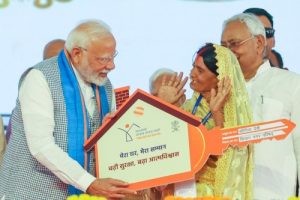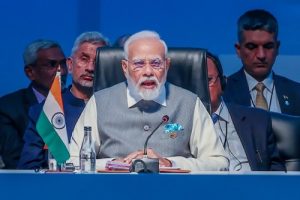O.P. Jindal Global University (JGU) has once again secured the top spot in the Education World India Private University Rankings 2023- 24 for the category of Liberal Arts and Humanities.
JGU scored the topmost rank on parameters of higher education excellence, including curriculum and pedagogy, research and innovation, leadership, internationalism, industry interface and faculty welfare and development.
The rankings were based on a special survey where all respondents voted on select criteria. JGU’s performance in the rankings is particularly noteworthy given the rise in the number of ranked institutions this year.
The university has also been consistently ranked as India’s No. 1 private university in the QS World University Rankings for the past three years.
Being ranked #1 in Liberal Arts and Humanities is a significant achievement for JGU, as it is the only university in India with a focus solely on social sciences, arts, and humanities. This ranking is a testament to JGU’s commitment to providing a world-class education in these fields and its efforts to constantly improve and innovate.
Spread across an 80-acre campus in Sonipat (Haryana), the university has been acknowledged for its excellence in the field of higher education, and this ranking serves as a reaffirmation of its high standards.
The Founding Vice Chancellor Prof. C. Raj Kumar thanked Education World for the Rankings Award and national recognition and said, “This is a testament to our unwavering dedication to academic excellence, innovation, and social impact. At JGU, we are committed to playing a pivotal role in developing well-rounded, compassionate, and socially responsible graduates, who can competently tackle the multifaceted challenges of the 21st century.
“Our institutional objective is to first establish JGU as India’s most comprehensive law and liberal arts university. To that end, we have already established 12 inter-disciplinary schools — law, business, liberal arts and humanities, banking and finance, international affairs, government and public policy, etc. – within JGU.
On this momentous achievement JGU’s Registrar Prof. Dabiru Sridhar Patnaik, who accepted the Rankings Award on behalf of the University, said, “In the modern era, universities are redefining the concept of a well-rounded education to suit the needs of the 21st century. JGU provides students with opportunities that go beyond traditional academic subjects to ensure their personal and professional growth.
“Apart from honing their theoretical knowledge, the university emphasises on the development of practical skills, critical thinking, creativity, and problem-solving abilities to prepare students for future challenges. This multidisciplinary approach to education offers a comprehensive understanding of the world and enables graduates to succeed in a rapidly evolving job market.”
The Registrar of JGU Prof. Patnaik earlier participated in an exclusive panel discussion on the theme of ‘NEP 2020: The Way Forward’ along with the renowned educationalists from across India who brought forth vast educational experience of shaping young minds and future leaders.
The panellists also included other eminent educationists, including Prof. Ramgopal Rao – Vice Chancellor BITS Pilai, Prof. Gautam Menon, DEAN Research, Ashoka University; Dr Sanjay Gupta, Vice Chancellor World University of Design; Dr Naresh Chandra, Director – B.K. Birla College and Abha Dev Habib – Professor Miranda House and Secretary, Democratic Teachers Front.
The panel discussion on ‘NEP 2020: The Way Forward’ was an informative event that brought together a diverse group of educational experts to discuss the new education policy. The panellists discussed and debated various topics, including the need for greater investment in education, the importance of teacher training, the need to make education more accessible to all and the leveraging technology and digitisation in teaching and developing tech-savviness among students from across socio-economic backgrounds.
They also shared their thoughts on how the NEP can be used to help India achieve its goal of becoming a knowledge superpower.
Another key theme that emerged from the discussion was the need to make education more relevant to the needs of the 21st century economy by introducing the multidisciplinary learning, which is the key to holistic growth and will also prepare young students to enter a world that is increasingly multifaceted, an atmosphere that nurtures dynamic thinking and transferable skills.

























Add Comment